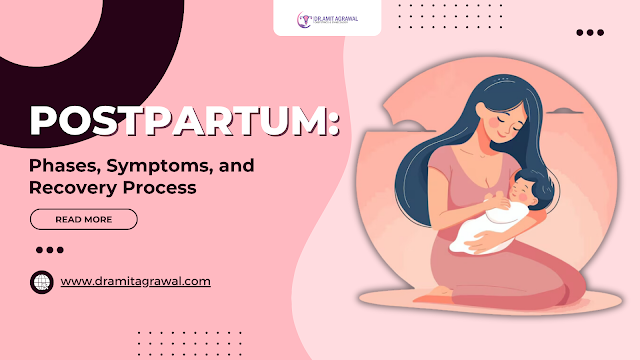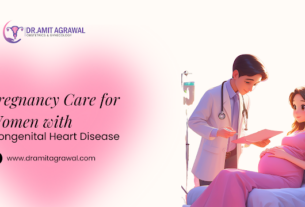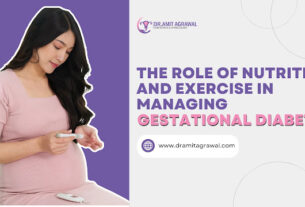The postpartum period, or the time after childbirth, is crucial for every new mother’s health and well-being. It is marked by physical, emotional, and hormonal changes as the body recovers from pregnancy and childbirth. Dr. Amit Agrawal emphasizes the importance of understanding the stages of recovery, the common symptoms you may face, and the time it takes to fully heal.
Stages of Postpartum Recovery
The postpartum phase is divided into three stages, each with unique characteristics and challenges:
- Immediate Postpartum (0-6 Weeks)
This stage focuses on physical recovery as your body heals and the uterus contracts back to its pre-pregnancy size. Expect some bleeding (lochia) and possible uterine cramps as well as emotional shifts due to hormonal changes. - Postpartum Recovery (6 Weeks-6 Months)
During this period, your body continues healing from childbirth, and your menstrual cycle may return. Many women also begin to regain their physical strength and start addressing emotional health, which may include symptoms of postpartum depression. - Long-Term Postpartum (6 Months & Beyond)
Your body continues to adjust to life after childbirth. Hormonal imbalances, emotional challenges, and physical recovery continue to evolve. Some women may experience residual symptoms such as weight fluctuations or skin changes.
Common Postpartum Symptoms
New mothers often experience a range of symptoms, both physical and emotional:
- Physical Symptoms:
- Vaginal bleeding or discharge (lochia).
- Uterine cramps as the uterus shrinks.
- Swelling and discomfort, particularly around the perineum (for vaginal births) or C-section incision.
- Sore breasts or difficulty breastfeeding.
- Hormonal and Emotional Symptoms:
- Hormonal changes can cause mood swings or baby blues, which affect many mothers in the first few weeks.
- Some women may experience postpartum depression (PPD), which requires medical attention and support.
- Physical Recovery Issues:
- Constipation or difficulty urinating, especially after a cesarean.
- Abdominal pain or discomfort as your body adjusts.
Postpartum Recovery Time
Recovery time varies for every woman, influenced by factors such as the type of birth (vaginal or C-section) and overall health. Generally, vaginal birth recovery takes around 6-8 weeks, while C-sections may require additional time for healing. It’s important to understand that emotional recovery may take longer than physical recovery, with many women feeling the emotional weight of new motherhood for several months.
How to Support Your Recovery
- Follow-up Appointments:
Regular visits to your gynecologist, such as with Dr. Amit Agrawal, are essential for checking your physical recovery and addressing any concerns. - Nutrition & Rest:
Eating well-balanced meals can provide the energy necessary for recovery and care of your newborn. Adequate rest is essential to help restore energy levels. - Mental Health:
It’s normal to feel overwhelmed at times. If you’re experiencing sadness, anxiety, or a lack of motivation, it’s important to reach out for help. Mental health professionals and support groups can help guide you through these feelings. - Physical Care:
Gentle exercises, approved by your healthcare provider, can help restore your strength and relieve tension. Always prioritize listening to your body’s needs during the recovery process.
When to Seek Help
If you notice persistent symptoms such as heavy bleeding, pain, emotional distress, or trouble with breastfeeding, it’s crucial to consult with a healthcare professional. Dr. Amit Agrawal is here to provide support, offer advice, and guide you through this important phase of life.
Contact Dr. Amit Agrawal
Recovering from childbirth is a unique journey, and you don’t have to navigate it alone. For personalized care and support during your postpartum recovery, book your appointment with Dr. Amit Agrawal today!
📍 Visit: Swastik Clinic, B2-17, Opposite Duttaguru Society, Sector 15, Vashi, Navi Mumbai
📞 Call Us: +91 8850461614 | +91 9437163294
📧 Email: dramit19@yahoo.com




